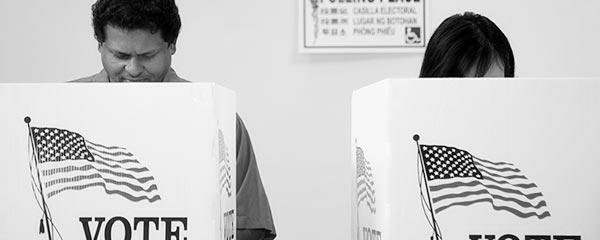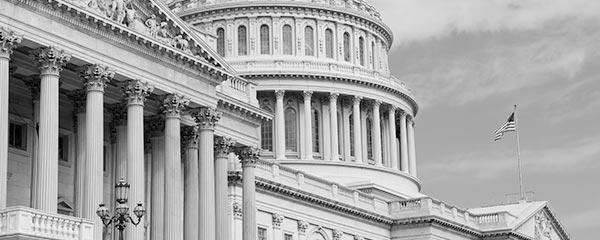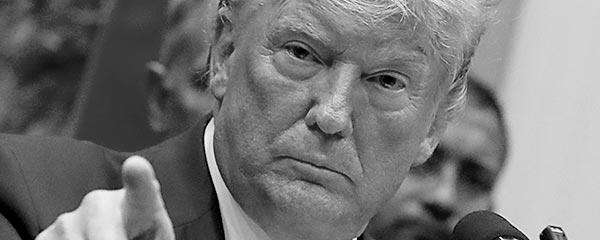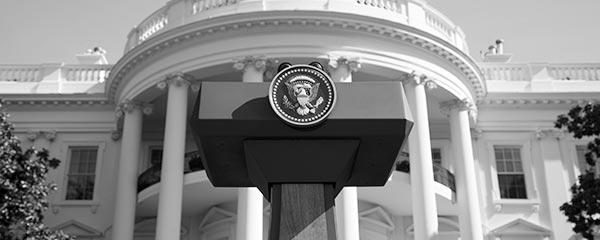Story Highlights
- Republicans prefer issue agreement now; Democrats want morality
- Under Clinton, preferences were reversed
- Americans overall favor presidents who set a good moral example
WASHINGTON, D.C. -- Republicans' and Democrats' preferences for strong moral values or issue agreement as more important in a president have undergone dramatic shifts compared with what they were during the Clinton administration.
Six in 10 Republicans say they would rather have a president who agrees with their political views but does not set a good moral example for the country, as opposed to one who sets a good moral example but does not agree with them politically. In contrast, 75% of Democrats prefer a president who sets a good moral example over one who agrees with their issue positions.
In 1999, Republicans' and Democrats' opinions were reversed, with Republicans favoring a president who sets a good moral example and Democrats preferring one who agrees with them politically.
Majorities of independents have consistently placed a higher premium on presidents setting a good moral example, although more do so now than during the Clinton years.

Both the 1999 and 2019 surveys were conducted as the incumbent presidents -- Democrat Bill Clinton and Republican Donald Trump, respectively -- were facing scrutiny for their personal and official behavior.
The Feb. 12-13, 1999, survey was conducted just after the Senate acquitted Clinton on impeachment charges related to his conduct in an affair with a White House intern.
The Oct. 14-31, 2019, poll was completed as the House considered impeaching Trump for allegedly withholding aid to Ukraine until the country agreed to conduct investigations to benefit him politically. Trump's extramarital affairs have also been an issue during his presidency, most notably in his campaign's paying two women during the 2016 election to keep silent about their past affairs.
Partisan Flip-Flop on Presidential Priorities
Notably, Democrats' views today are nearly identical to what Republicans' views were in 1999. Currently, 75% of Democrats choose setting a good moral example in the morality-issue agreement trade-off, while 19% opt for issue agreement. Twenty years ago, 75% of Republicans wanted presidents who set a good moral example and 17% wanted issue compatibility.
║┌┴¤═° first asked the question in 1994, long before the Monica Lewinsky affair and subsequent impeachment charges against Clinton. At that time, Congress was investigating Clinton's business dealings in the Whitewater matter, and Paula Jones, a former Arkansas government employee, had sued Clinton for sexual harassment. Democrats were more likely to say they preferred a president who set a good moral example (54%) over one who agreed with them on issues (37%).
But five years later, in a poll taken right after Clinton's impeachment case concluded, Democrats were more likely to say issue agreement was more important to them. Republicans' and independents' views changed little during the Clinton era.
The party shifts observed in the morals versus issues trade-off question are consistent with those seen in a 2018 ║┌┴¤═° survey asking Americans how important it is to them that the president provide moral leadership for the country. The percentage of Republicans who said it is very important for the president to provide moral leadership fell sharply in 2018 compared with the Clinton years. Meanwhile, more Democrats under Trump than under Clinton said it is very important.
Americans as a Whole Say Morality Is More Important
The wide partisan shifts have largely offset each other in the aggregate, as the opinions of Americans as a whole have been fairly steady since 1994. Fifty-eight percent of U.S. adults currently say they prefer a president who sets a good moral example, little changed from 59% in 1994 and 52% in 1999.

Implications
As the House of Representatives conducts its impeachment investigation into Trump, Americans continue to value a president who disagrees with them politically but sets a good moral example over one who agrees with them politically but has questionable morals. However, partisans' views today are very different from the last time a president was impeached.
Although the question about prioritizing morality or issues is phrased in general terms without mention of any specific president, partisans appear to have the current president in mind when answering. Supporters of the incumbent president may attempt to minimize his weaknesses while opponents maximize them when answering the trade-off question. Thus, they are mostly answering in a way that aligns with their support for or opposition to the current president, rather than answering in a philosophical way about presidents in general.
Clearly, then, attitudes about presidential morality versus issue compatibility are not established preferences that people hold across presidencies. The results powerfully illustrate how people's priorities and values are influenced by the interaction of their partisanship and the current political environment.
Because ║┌┴¤═° has asked the question only during the Clinton and Trump administrations, it is not known how Americans in general, and partisans in particular, might answer during a presidency that has not been dominated by investigations and charges of unethical (if not illegal) behavior.
View complete question responses and trends.
Learn more about how the works.
Explore President Trump's approval ratings and compare them with those of past presidents in the ║┌┴¤═° Presidential Job Approval Center.
Learn more about public opinion metrics that matter for the 2020 presidential election at ║┌┴¤═°'s 2020 Presidential Election Center.




